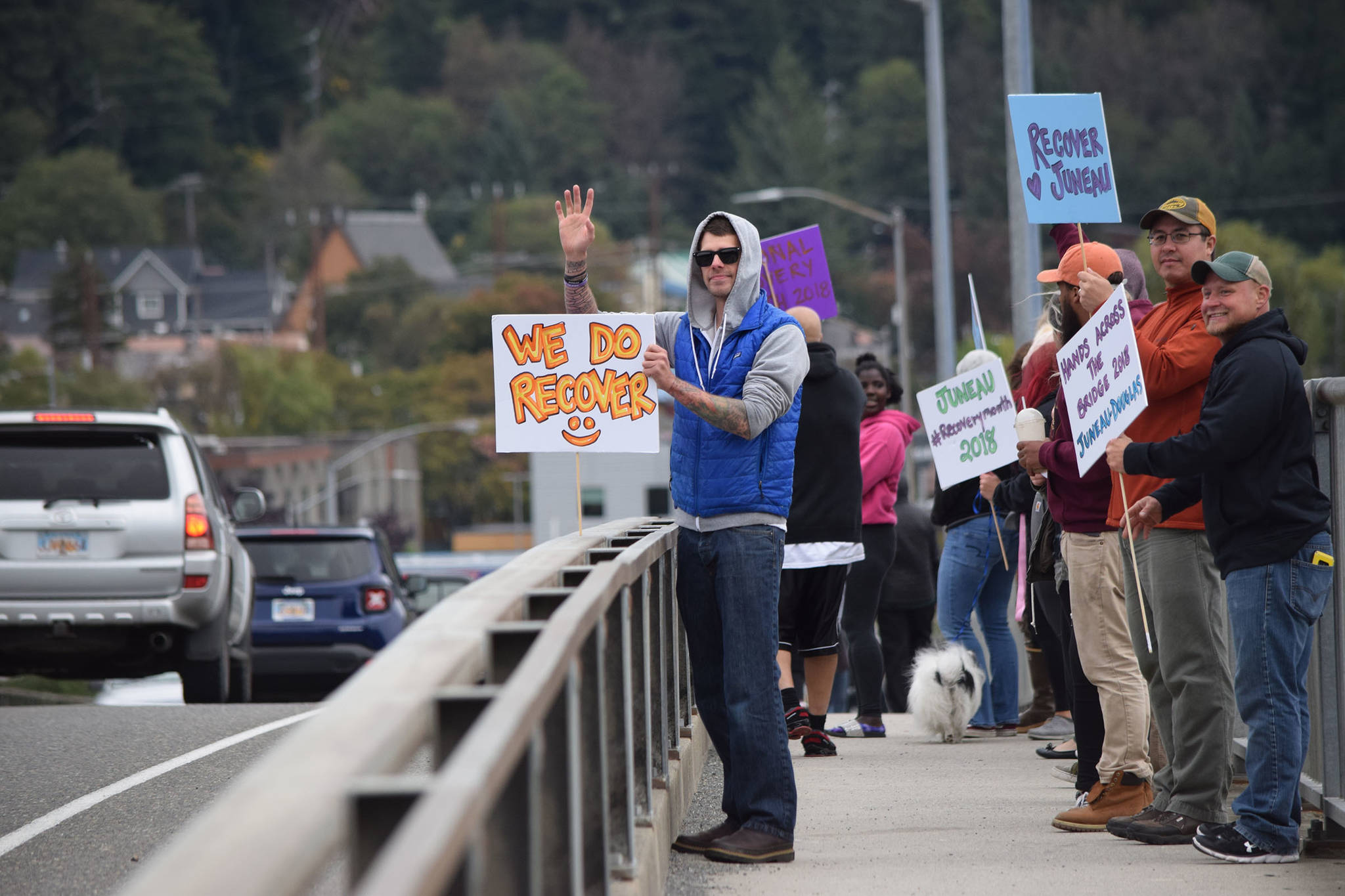A few dozen gathered on Saturday on the Douglas Bridge, holding hands in an outstretched line at the bridge’s apex.
Together, they recited a verse.
“God grant me the serenity to accept the things I cannot change; courage to change the things I can; and wisdom to know the difference.”
Great Bear Recovery Collective, a local support group for those who live with or are recovering from substance use, organized the Hands Across the Bridge event on Saturday in an effort to bring awareness to substance use in Juneau.
What they repeated is called the Serenity Prayer. It’s a guiding mantra for many who live in recovery from substance use.
Many who attended said they have accepted that staying sober is a challenge they’ll continue to face long after getting clean. They can’t change the brain chemistry which calls them back to drug and alcohol use.
But what they can change, said organizer Carrie Amott, is the stigma that’s attached to substance use. Those living with substance use need support, and looking down on them doesn’t help.
One of the big things people can do to combat that stigma, Amott said, is to educate themselves on what substance use disorder is and how it affects people’s lives. Amott herself is in recovery, and works as a peer support specialist at the National Council on Alcoholism and Drug Dependence in Juneau.
“It takes more than just the person who’s struggling to get sober,” Amott said.
Juneau needs more recovery resources, she said, especially more bed availability for residential treatment centers. A detox facility in Juneau would be “really helpful,” she said.
Community members can work to become more informed by visiting NCADD and by voting for public officials who support funding for recovery resources. (Great Bear Recovery Collective hasn’t endorsed any candidates for upcoming municipal and state elections, Amott said.)
[Opinion: Recovery is a path, but not an easy one]
“More community involvement would really help Juneau out, to help reduce the stigma so that people aren’t so ashamed to reach out to help. That’s kind of why we do these things,” Amott said.
People who have had success in recovery can talk about their story more, she said. When people know others who are struggling, their self-esteem can improve. Negative emotions associated with thinking you’re the only one with a problem can trigger continual use, she said
Talking about their personal struggles with substance use is not something the group generally shied away from.
[Opinion: Recovery takes a community]
Bella Wimberley, 15, shared her story.
“I started out really young. I grew up in a really rough home. Basically, it was something I grew up around,” she explained.
Then she got arrested, went through juvenile justice court and was sent to treatment. She has since found sober friends through Great Bear Recovery Collective and other places, and has started to rebuild a relationship with her family.
“Counseling is a really important thing, just to have people to talk to,” Wimberley said.
Mazee O’Kelley, 16, was a self-described addict for three years. She’s since been sober for two months.
She said the first month was the toughest, but she’s learned a few things that have worked to help her stay sober.
“Once you get over that point, that breaking point, and start enjoying sober activities instead of just using, it gets so much easier,” she said.
She’s been getting into painting and takes walks, which help, she said. When she was using, she isolated herself socially, but now, she’s enjoying making new friends who don’t use.
“Just talking to people again felt so great, just being sober,” she said.
September is National Recovery Month. More information about resources that are available in Juneau can be found at the NCADD office downtown and at Rainforest Recovery Center. Great Bear Recovery Collective organizes sober activities and posts them on their website at greatbearrecovery.com.
• Contact reporter Kevin Gullufsen at 523-2228 and kgullufsen@juneauempire.com. Follow him on Twitter at @KevinGullufsen.

